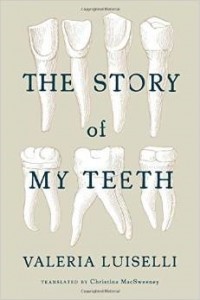184 pp, $16.95
Reviewed by Leland Cheuk
In Valeria Luiselli’s first novel Faces In The Crowd, a promiscuous, melancholy mother loses herself so thoroughly while translating the work of a Mexican poet named Gilberto Owen that her narration slowly becomes that of the equally promiscuous, swashbuckling poet. In Luiselli’s funny new picaresque The Story of My Teeth, Gustavo “Highway” Sánchez Sánchez picks up where Owen left off. He too is a charismatic raconteur whose first-person narration simultaneously charms and cuckolds. Highway not-so-humbly describes himself as “the best auctioneer in the world.” He collects all kinds of objects, including the teeth of the famous. He claims to be wearing Marilyn Monroe’s choppers. He’s got a serious case of Napoleon Complex because he attributes many of his unusual aphorisms to Napoleon (I doubt the French emperor ever said “it wasn’t all velvet petals and marshmallow clouds”). As an auctioneer, Highway spins elliptical, impressionistic love letters about the objects he’s trying to sell. About Plato’s teeth, he says:
Our first lot is a piece in a somewhat deteriorated state…Significant flattening of the point leads to the supposition that the original owner, Mr. Plato, talked and ate continuously…Mr. Plato once made a comparison between the period of dentition and a man falling in love: “In this state, the soul enters into effervescence and irritation; and this soul, whose wings are just beginning to develop, can be compared to a child whose gums are inflamed and enervated by its first teeth.”
The Story of My Teeth explores the question of how objects acquire value and meaning outside the walls of galleries and museums, and whether narrative can affect an object’s worth. Highway’s absurd pontifications about his objects represents the novel’s central question. In this passage, Highway tries to connect the value of his teeth to the souls of its owners:
All the original owners of these teeth were considered social parasites, ne’er-do-wells, and sluggards; many suffered from dementia, megalomania, graphomania, melancholy, erotomania, and acute egomania. But despite all those negative characteristics, they were the possessors of profound souls and magnificent teeth…Taken as a collection, the teeth of those infamous people are, to use an auctioneering term, a “metonymic relic.” And you don’t have to be superstitious to know that, when used correctly, certain objects can transfer their powerful qualities to us.
By leaving his wife and young son to chase his dream of becoming a world-traveling auctioneer, Highway himself becomes an infamous person – a metonymic relic – to his abandoned son. Highway eventually faces a reckoning for the life he’s led, though it’s unclear he has enough self-awareness to view it as such. The pleasure in The Story of My Teeth lies primarily in Highway’s voice, which suddenly disappears in the last third of the novel. Luiselli switches rails and begins providing narrative fragments of Highway’s story told through photographs, secondary narrators, timelines and epigrams to make us question our relationship to Luiselli’s work. The Story of My Teeth was written as an art project for a Mexico City gallery funded by a nearby juice factory. Luiselli solicited feedback from a reading to a group of its workers and incorporated their personal accounts into Highway’s bizarre life story.
Just as Highway is willing to auction off anything (including himself at one point), Luiselli has proven in both her novels that she’s willing to break novelistic conventions to simultaneously tell and deconstruct her stories. If you don’t mind some post-postmodernism with your misadventures, The Story of My Teeth is well worth bidding on.
***
Leland Cheuk’s novel THE MISADVENTURES OF SULLIVER PONG is forthcoming in 2015 (CCLaP Publishing). He is a MacDowell Colony fellow, and his short fiction has appeared in publications such as Valparaiso Fiction Review, Tahoma Literary Review, and Lunch Ticket. He has an MFA in Creative Writing from Lesley University and lives in Brooklyn.
![[PANK]](http://pankmagazine.com/wp-content/themes/pank/assets/images/pank-logo-large.png)

